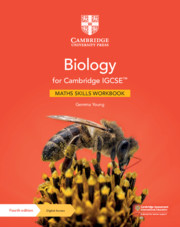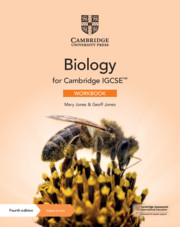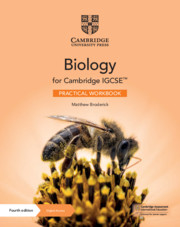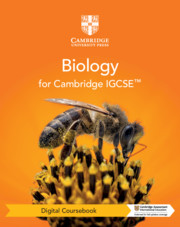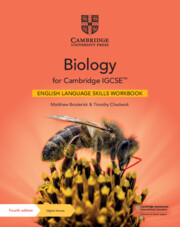The maths skills workbook helps learners to develop their maths skills in the context of the Cambridge IGCSE™ Biology syllabus. These skills are crosslinked to the coursebook to help students understand how to use them. Practice exercises provide opportunities for learners to practise each maths skill. To support students in acquiring these skills, the exercises gradually increase in complexity. Practice questions provide opportunities for students to practise their skills in an active learning format such as discussion opportunities and pair work. Exam-style questions give students the chance to apply the skills they have learnt in an exam-style context. In the last chapter, students will need to select which maths skills they ought to apply in different contexts, without the structure and guidance provided in each of the chapters, helping them become confident, independent learners. The answers can be found online at www.cambridge.org/go
Features
- Written by experts in both biology and mathematics based on research carried out by the Nuffield Foundation and the Association for Science Education (ASE)
- Maths skills are crosslinked to other resources in the series to help students understand how to use them
- Practice exercises gradually increase in complexity to support students in developing maths skills
- Worked examples illustrate the concept, provide a skills-based step-by-step approach to answering a question, helping learners to develop their thinking processes
- The ‘Look out’ feature makes students aware of common misconceptions that might be holding them back
- Exam-style students require students to select which maths skills they ought to apply in different contexts, without the structure and guidance provided in each of the chapters, helping them become confident, independent learners
- The answers can be found online at www.cambridge.org/go.
Table of Contents
- How to use this series
- How to use this book
- Introduction
- Skills grid
- 1. Representing values
- Maths focus 1: Using units
- Maths skill 1: Choosing the correct unit
- Maths skill 2: Using unit symbols
- Maths skill 3: Using derived units
- Maths focus 2: Representing very large and very small numbers
- Maths skill 1: Writing very large numbers in standard form
- Maths skill 2: Writing very small numbers in standard form
- Maths focus 3: Using unit prefixes and converting units
- Maths skill 1: Using powers of ten
- Maths skill 2: Using negative powers of ten
- Maths skill 3: Using unit prefixes
- Maths skill 4: Converting units
- Exam-style questions
- 2. Working with data
- Maths focus 1: Naming types of data
- Maths skill 1: Identifying independent and dependent variables
- Maths skill 2: Identifying types of data
- Maths focus 2: Collecting data
- Maths skill 1: Choosing a suitable measuring instrument
- Maths skill 2: Reading the correct value on measuring instruments
- Maths skill 3: Using the correct number of significant figures
- Maths focus 3: Recording and processing data
- Maths skill 1: Designing a suitable results table
- Maths skill 2: Calculating the mean
- Exam-style questions
- 3. Drawing graphs and charts
- Maths focus 1: Drawing bar charts
- Maths skill 1: Choosing a suitable scale for the y-axis
- Maths focus 2: Drawing histograms
- Maths skill 1: Putting the data into classes
- Maths focus 3: Drawing line graphs
- Maths skill 1: Drawing the axes
- Maths skill 2: Plotting the data points
- Maths skill 3: Drawing the line or curve of best fit
- Exam-style questions
- 4. Interpreting data
- Maths focus 1: Interpreting bar charts, histograms and pie charts
- Maths skills 1 and 2: Identify the categories and describe what the data show
- Maths focus 2: Interpreting relationships in graphs
- Maths skill 1: Interpreting straight-line graphs
- Maths skill 2: Interpreting more complex line graphs
- Maths skill 3: Interpreting scatter graphs
- Maths focus 3: Reading values from a line graph
- Maths skill 1: Interpolation
- Maths skill 2: Extrapolation
- Exam-style questions
- 5. Doing calculations
- Maths focus 1: Calculating percentages
- Maths skill 1: Calculating percentages
- Maths skill 2: Calculating percentage change
- Maths focus 2: Using scale drawings and magnification
- Maths skill 1: Interpreting scale drawings
- Maths skill 2: Using the magnification formula
- Maths focus 3: Understanding ratio and probability
- Maths skill 1: Calculating ratio
- Maths skill 2: Calculating probability
- Exam-style questions
- 6. Working with shape
- Maths focus: Calculating area
- Maths skill 1: Calculating the surface area of a cube and a rectangular block
- Maths skill 2: Calculating the area of a circle
- Exam-style questions
- Additional questions involving several maths skills
- Glossary
- Acknowledgements.
Advice on useful tools
Advice on useful tools, activities and timetabling from teachers experiencing school closures.
Cambridge GO
All our supporting resources have now moved to Cambridge GO – the new home for your Cambridge digital content.
Listen to our podcast
Listen to our podcast to discover teaching inspiration & advice from leading educational thinkers.

